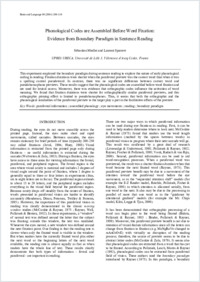Phonological Codes are Assembled Before Word Fixation: Evidence from Boundary Paradigm in Sentence Reading
- Miellet, Sebastien University of Lille 3, France
- Sparrow, Laurent University of Lille 3, France
-
2004
11
English
This experiment employed the boundary paradigm during sentence reading to explore the nature of early phonological coding in reading. Fixation durations were shorter when the parafoveal preview was the correct word than when it was a spelling control pseudoword. In contrast, there was no significant difference between correct word and pseudohomophone previews. These results suggest that the phonological codes are assembled before word fixation and are used for lexical access. Moreover, there was evidence that orthographic codes influence the activation of word meaning. We found that fixation durations were shorter for orthographically similar parafoveal previews, and this orthographic priming effect is limited to pseudohomophones. Thus, it seems that both the orthographic and the phonological similarities of the parafoveal preview to the target play a part in the facilitative effects of the preview.
- Faculty
- Faculté des lettres et des sciences humaines
- Department
- Département de Psychologie
- Language
-
- English
- Classification
- Psychology
- License
-
License undefined
- Identifiers
-
- RERO DOC 27180
- DOI 10.1016/S0093-934X(03)00442-5
- Persistent URL
- https://folia.unifr.ch/unifr/documents/301994
Statistics
Document views: 182
File downloads:
- Phonological Codes are Assembled Before Word Fixation: Evidence from Boundary Paradigm in Sentence Reading: 235
